In 2015, when an estimated one million Golden State Warriors fans overtook the area south of Lake Merritt to celebrate Oakland’s newly-crowned basketball champions, many of them passed by the tall, concrete exterior walls of the Oakland Museum of California without even noticing the cultural institution within.
Oakland Museum of California to Undergo $20m Renovation to Exterior, Courtyard
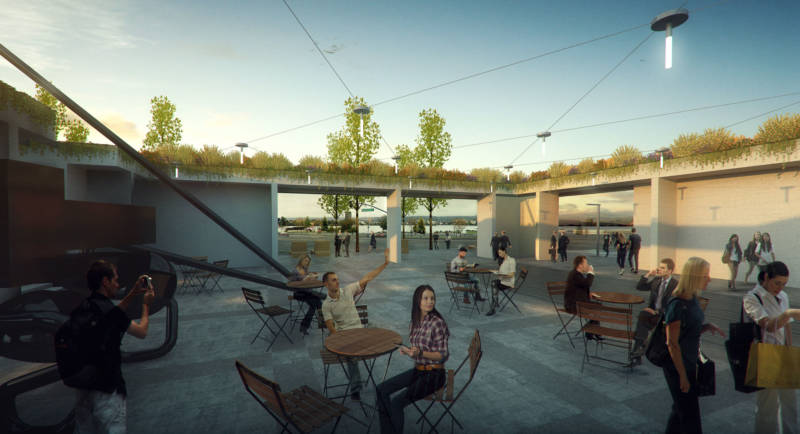
For museum director Lori Fogarty, it was a revelation: The parade revealed to her the art, history and science museum’s need to physically reflect its community engagement mission by opening up its brutalist concrete edifice—especially on the corner facing 12th Street and Lake Merritt.
Now Oakland Museum of California (OMCA) is preparing to do just that, dramatically renovating its 7.7 acre grounds with a mind to accessibility as well as overhauling landscaping and outdoor sculptures.
The idea, Fogarty said during a recent tour, is to make the structure porous enough that pedestrians approaching Lake Merritt from Laney College or Chinatown intuitively navigate through the museum’s terraced gardens, and to connect with the long-awaited redevelopment of the adjacent Henry J. Kaiser Convention Center and its 1,500-seat Calvin Simmons Theater.
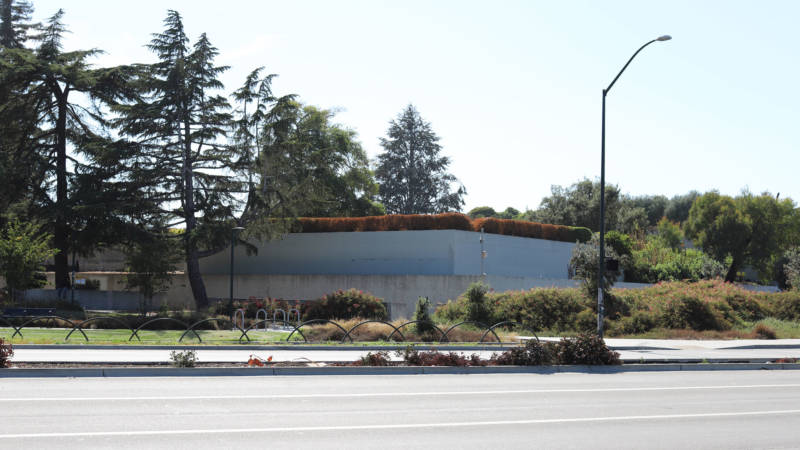
“It’s about opening up the museum to the surrounding community,” Fogarty said of the project expected to reach completion by next fall. “We want this to be considered a public park.”
The museum’s central courtyard is currently arrayed with planters, sculptures and multilevel walkways. “But a lot of people don’t know the gardens are here,” Fogarty said. The plan includes three, 20 foot wide openings in what are now featureless walls on the northeast corner facing the lake, and an outdoor stage for programming such as the Friday Nights series.
A new, wheelchair-accessible ramp will similarly lead from 10th Street to the museum cafe through what’s currently a windowless slab of concrete. (Right now the cafe attracts few besides OMCA staff, county workers, and jurors and lawyers from the neighboring courthouse.) Cafe and gardens access will not require a museum ticket, and Fogarty hopes to expand their hours.
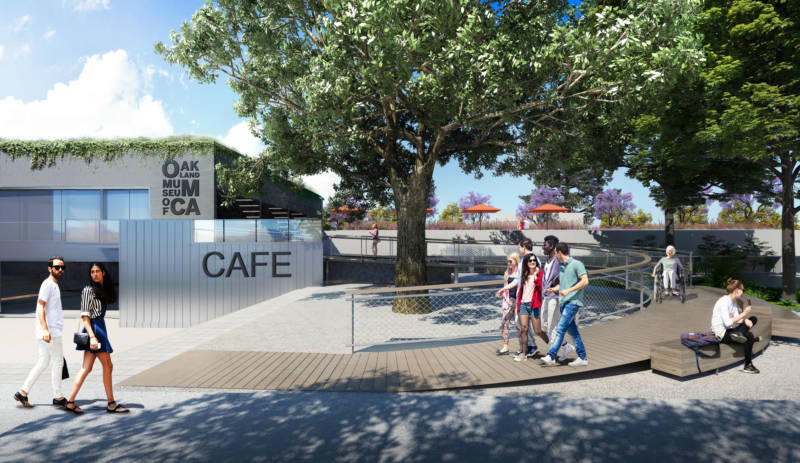
The renovation, led by Hood Design Studio and Mark Cavagnero Associates, is projected to cost $18-$20 million and is scheduled to finish by fall 2020; construction is not expected to disrupt gallery access. OMCA has raised most of the money, Fogarty said, as part of an ongoing $85 million capital campaign aimed largely at boosting the museum’s resources for acquisitions and programming.
OMCA opened in 1969 as a free “museum for the people” with multiple entrances. Fogarty said early designs by architect Kevin Roche included 12th St. openings. Mentioning demonstrations at the courthouse at the time, particularly rallies supporting embattled Black Panther leader Huey Newton, she speculated that the corner was ultimately enclosed due to “security concerns.”
The City of Oakland, which owns the museum property, is supporting the project through new markets tax credits. Earlier this year Oakland City Council approved $20 million in tax credits to be divided between the museum and Orton Development’s Kaiser Convention Center renovation, although Fogarty said she does now know the exact amount OMCA will receive.
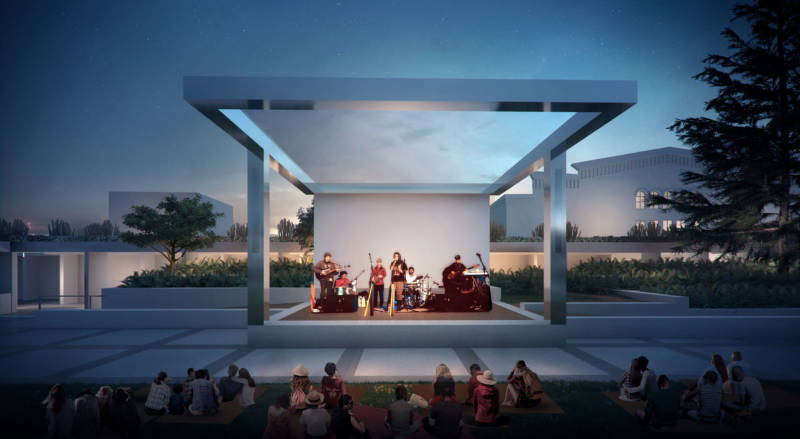
The details bring into focus a new look for the south end of Lake Merritt, where the Kaiser Convention Center is also slated to reopen as mostly office space by fall 2020. Fogarty said the driveway between the museum and the landmark Kaiser building, which Orton plans to rechristen the “Oakland Civic,” will be closed to vehicles; Hood Design is the landscaping contractor on both projects.
The museum renovation also involves rotating its outdoor sculptures. Nine of 23 sculptures will be sold, placed in storage or returned to lenders, and six new pieces will be installed. Among the objects slated for removal is one of three pieces by Berkeley sculptor Stephen De Staebler as well as large-scale sculptures by artists including Fletcher Benton and Michael Bigger.
Incoming works, meanwhile, include abstract ceramicist Peter Voulkos’ 1969 cast bronze sculpture Mr. Ishi as well as works by Betty Gold, John Mason and Jun Kaneko. Bruce Beasley’s Foray III will be swapped for Pillars of Cypress. Other notable objects exhibited outdoors are Tony Labat’s painted steel Big Peace IV and Viola Frey’s glazed ceramic figure American Nude Series (Woman with Elbow on Raised Knee). According to Fogarty, the outdoor collection will also be augmented by interpretative plaques.
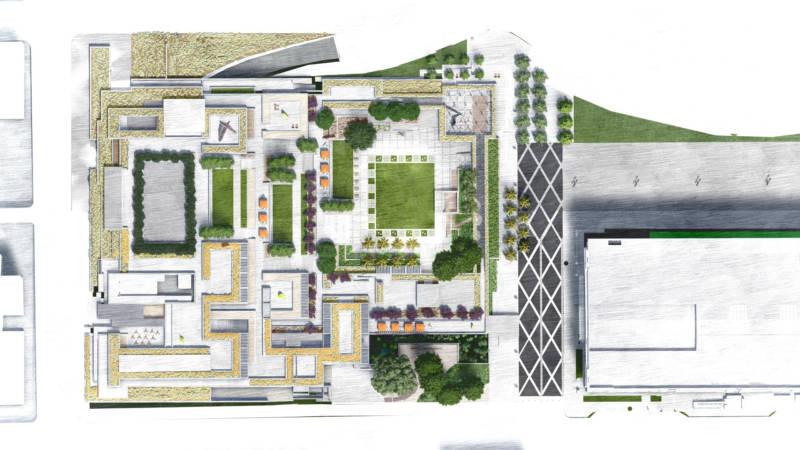
The landscaping plan from Hood Design involves theming each outdoor terrace around one of five California ecoregions emphasizing native flora. (The mature oak, redwood and olive trees will remain.) “We’re a museum of California art, history and natural sciences and these are not native plants,” Fogarty said.
Fogarty went on to say that for decades until the museum cut operational ties to the City of Oakland in 2010, the landscaping was managed by the public works department. “So right now we have a kind of low-maintenance homogeneity,” she said.
Hood Design, in a presentation, has described visitors moving from the study of art and cultural and natural history in OMCA’s galleries to contemplating nature itself outdoors.
Oakland Museum of California reopened its galleries in 2010 after a $58 million renovation that was also led by Mark Cavagnero Associates. The project expanded OMCA’s exhibition and programming spaces and transformed the museum’s skylit canopy entrance from Oak Street.
(Editor’s Note: This story has been updated to reflect a corrected list provided by the Oakland Museum of California of sculptures to be removed.)

